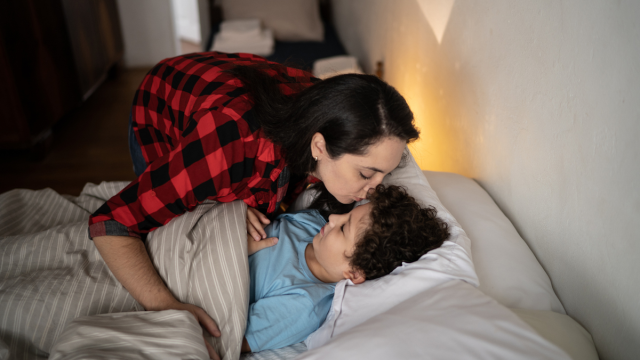Ah, bedtime. You know, that magical moment when you collapse onto a kid-less couch and enjoy the silence, a beverage of your choice, and quality time with your partner (or by yourself). You’ve earned it. But is that bedtime early enough? According to this study, earlier bedtimes can improve parents’ mental health, so you might want to rethink that time.
Starting in 2004, thousands of families participated in a study conducted by Murdoch Children’s Research Institute in Melbourne, Australia, called Growing Up In Australia. While the research looked at many factors to study the impact of the immediate and broader environment on child development, tracking families over several years, one of the more interesting findings was that earlier bedtime for kids not only led to better health-related quality of life for kids, but it also improved the moms’ mental health.
Why? According to the study, kids who don’t meet the minimum sleep guidelines show symptoms of poor mental health (unhappiness and anxiety), tend to be late or absent more often and spend more time on homework. This can lead to stressed and tired kids which can lead to stressed and tired parents. And, even though sleep requirements decrease as kids age, many school-grade kids still weren’t meeting the guidelines. It showed that four out of five children thought they were getting enough sleep when they were not.
So what is that magic bedtime hour? It depends on the age of your child. According to the sleep chart above, if your six-year-old gets up at 6:30 or 7 am, their bedtime should fall between 7:30 and 8:30 pm! Putting kids to bed earlier might seem challenging, especially if you have after-school activities to balance, but there are ways to make it happen. If you have a first-timer heading to the classroom this year, this study on the effects of 10+ hours of sleep might convince you even more.
RELATED STORIES
The Most Powerful Family Ritual? The Bedtime Story
Tips for Starting (& Keeping) a Successful Bedtime Routine
Getting 10+ Hours of Sleep Has a Huge Impact on Kindergarteners, Study Shows
